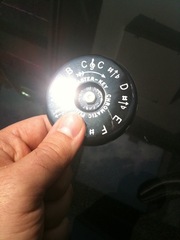
You have two choices: join a group or start a group.
If you have the vision, the skills and the tireless energy to create your own group, then by all means create your masterpiece. (These articles will help.)
But for everyone else, you'll want to find an existing or newly forming group and audition. This article shows you how to find a cappella groups in your area.
Even if your ideal style isn't available, you should still consider joining a group. The training will prepare you to ace future auditions and the resume boost will show that you're dedicated to a cappella.
Besides, you may be surprised at how much you enjoy singing a style that you previously didn't even enjoy listening to.
Often, the group you're really looking for can be formed from within a group of a different style. Many classical choirs feed into smaller, more pop-oriented ensembles. These groups often share resources like fans, equipment and concerts.
If you're in college, there's a good chance that your campus activities office can direct you to your school's existing groups. And there may be many groups to choose from, as some school's have enough interest to support a plethora of a cappella styles. Take Northwestern University. Nearly 20 groups, each composed of 12 or more singers are supported by an undergraduate body of less than 9,000 with styles ranging from pop to Baliwood.
Most collegiate groups hold their auditions in the fall, but it's always worth making contact as soon as you can, even if auditions are over. At the very least you can see the group in concert and get on their mailing list for the next round of auditions. And at best, a group member's semester abroad may lead to an unexpected opening for a friend of the group who happened to be at the right place at the right time.
Keep in mind that some college groups aren't officially part of the university. That makes them harder to track. You'll need to search online, check performance calendars and ask around to find them. Don't just accept the answer you get from the student information help desk.
You may also get some help from sites like collegiate-acappella.com and the acapedia. Both sites compile extensive lists of groups, although both struggle to remain accurate. You'll find a treasure trove of groups, even if you must wade through a pile of defunct ones to get there.
If there aren't any groups on campus, speak to the choral director or the head of the music department about forming one.
If they aren't responsive, try speaking with the school's recruitment department since a cappella groups are often closely tied with boosting applications. It's much easier and less expensive for an a cappella group to perform at a high school, than for the football team to come down and play an exhibition game.
If you are a high school student, you'll want to start your search with your choral director.
No matter what your age, you can always try the barbershop route. The music may be old-fashioned. The jokes are definitely corny. But the camaraderie is the stuff of legend, the conventions are some of the most well-attended, and the musical training is top-rate.
Men should check out the Barbershop Harmony Society (formerly known as SPEBSQSA) and women should check out both Sweet Adelines International (SWI) and Harmony, Inc.
If you are an adult, you have a world of options beyond barbershop.
You could start at the top. In the United States, most professional level auditions are posted in actors trade magazines/websites like Backstage. This is where auditions for a cappella musicals like VocaPeople, Transit or Minimum Wage would be announced. It's also often where professional groups like Rockapella or Blue Jupiter advertise when they need a new member.
Unfortunately, 99% of the information there will be useless, as most postings relate to non-a cappella acting and singing jobs. Additionally, if you're just starting out, these auditions may be beyond your current skills.
Many a cappella audition notices are posted on the forums now hosted jointly at www.RARB.org The Recorded A cappella Review Board, and www.CASA.org, The Contemporary A cappella Society of America.
Currently, however, these forums are international with a heavy bias towards the US. You'll see auditions for groups hundreds, or thousands of miles away from you. The posts are not easily broken out by geography, so finding local groups auditioning, may take some digging.
To learn about the current, active, small pro and semi-pro groups, check out the National Harmony Sweepstakes Competition and find the regional competition nearest to you. Attend the event and you'll get their best 10 minute set. The program is also likely to have notices of other a cappella activities.
But even if you can't attend, you can use the website to track and contact the area's best groups. Check out each group's own site. They may be having auditions. Get in touch. Let them know you're looking to audition, and even if they don't have a spot, they might have a lead.
As an example, the New York Harmony Sweepstakes site lists a number of New York City's best groups. However, it will also list a few groups from Europe. Groups do sometimes apply from afar. That's to be expected in a city like New York. So be prepared for a few travelers when you look at your regionals.
Vocal Area Network as another example, is for New York vocal ensembles, with an emphasis on classical choral music. That style might not be your favorite, but posting on that site is still a great way to reach singers involved in multiple styles. See if your area has an online choral community and let them know you're looking. The American Choral Directors Association and MENC, The National Association for Music Education may both prove helpful in this search.
Some areas have websites dedicated to local activities. The Boston A cappella Scene may not always be up-to-date, but by focusing on one geographical area, the postings are more relevant to Bostonians.
A cappella festivals are the most fun place to network and learn the craft of a cappella. Once a rarity, there are now a fair number of well-respected festivals to choose from all over the world:
- SingStrong International A cappella Festival (Virginia./DC)
- Mile High Vocal Jam (Denver, Colorado)
- A cappella Stock (Ogden, Utah)
- AcaFest (Chicago, IL)
- Los Angeles A cappella Festival LAAF (Los Angeles, CA)
- SoJam (Durham, North Carolina)
- London A cappella Festival (London, England)
- Aarhus Vocal Festival (Aarhus, Denmark)
- The Hong Kong International A cappella Festival (Hong Kong, China)
- The Real A cappella Festival (Sweden)
- VoCAL Nation (various locations)
- Social Media A cappella Conference (Rochester, NY)
- ACAPAJEWZA (New York City, NY)
- The Jewish A cappella Festival of Downtown Washington (Washington DC)
- Barbershop Harmony Society Conventions (multiple US locations)
- A cappella Festival fur VokalMusik (Leipzig, Germany)
- The A cappella Society of Singapore (Various locations and events in Singapore)
- Total Vokal (Graz, Austria)
- Festival 500 (St. John's NL Canada)
- Sing Toronto (Toronto Canada)
Yahoo hosts a page focused on New York a cappella groups. Perhaps there's a yahoo group based around your location.
When joining open public groups such as these, consider using an email address at which you are prepared to receive a fair amount of spam, since spambots do troll these pages. Free email addresses are available through google and many other providers.
Google hosts groups on the topic of a cappella as well, including the usenet group, rec.music.a-cappella. This was the a cappella communication forum of choice in the 1990s, but fell out of favor at some point in the 2000s as email, forum and website usage changed. Again, you'll see posts that are mostly oriented around the US. Currently, .rec and .alt are, at best, a repository of duplicate postings, and at worst, a complete waste of time.
Europeans should visit The European Voices Association. Formed in 2011, this organization is dedicated to a cappella, vocal and rhythmic choral music. The Real Community is another must-visit for Europeans, especially Swedes. Their forums function much as the RARB/CASA forum does. Germans should make sure to visit acappella-online for the latest in German a cappella.
Finally, social networks like facebook return a wealth of hits for searches like a cappella. Friend and follow the people and organizations who are making the music you find inspiring. Let them know your interests and before long you may find that perfect connection.
The right group is out there, just waiting to be uncovered. Seek and ye shall find!

 RSS Feed
RSS Feed